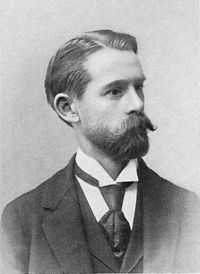Herbert Spencer Jennings
From Wikipedia, the free encyclopedia
| Herbert Spencer Jennings | |
|---|---|
 | |
| Born |
April 8, 1868 Tonica, Illinois |
| Died |
April 14, 1947 Santa Monica, California |
| Fields | zoology |
Jennings was so struck by the continued production of hereditarily diverse clones at conjugation, even after many successive inbreedings, that he undertook to examine the matter mathematically. As a result, general formulae for the results of diverse systems of mating were published in a series of papers between 1912 and 1917; these were one of the main seeds from which the whole field of mathematical genetics developed.
In 1924, Hennings published an article in Scientific Monthly on "Heredity and Environment" which was prescient for anticipating the double helix, and provocatively liberal for its comments on racial differences and American immigration policy. (The Scientific Monthly, Vol. 19, No. 3 (Sept., 1924), pp. 225-238)
References
- Marler, Peter (2005), "Ethology and the origins of behavioral endocrinology.", Hormones and behavior (Apr 2005) 47 (4): 493–502, doi:10.1016/j.yhbeh.2005.01.002, PMID 15777816
- Schloegel, Judy Johns; Schmidgen, Henning (2002), "General physiology, experimental psychology, and evolutionism. Unicellular organisms as objects of psychophysiological research, 1877-1918.", Isis; an international review devoted to the history of science and its cultural influences (Dec 2002) 93 (4): 614–45, PMID 12664793
- Barkan, E (1991), "Reevaluating progressive eugenics: Herbert Spencer Jennings and the 1924 immigration legislation.", Journal of the history of biology 24 (1): 91–112, doi:10.1007/BF00130475, PMID 11612743
- Sonneborn, T M (1974), "Herbert Spencer Jennings.", Biographical memoirs. National Academy of Sciences (U.S.) 47: 143–223, PMID 11615625
External links
- T.M. Sonneborne article on the life of Herbert Spencer Jennings
- H. S. (Herbert Spencer) Jennings papers American Philosophical Society
- National Academy of Sciences Biographical Memoir
|
This article is issued from Wikipedia. The text is available under the Creative Commons Attribution/Share Alike; additional terms may apply for the media files.